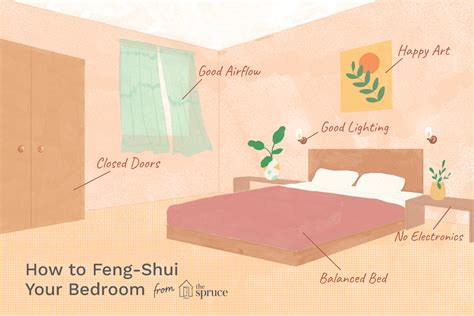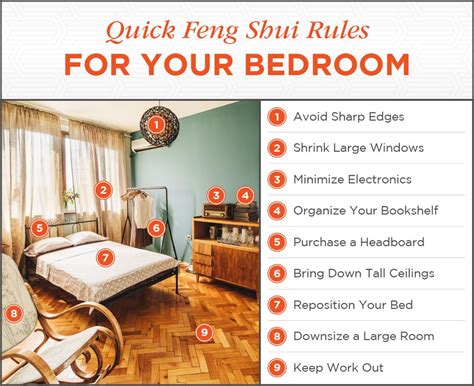
Cluttered bedrooms, electronics, neglected plants, and specific artwork can disrupt the flow of positive energy and negatively impact well-being, according to Feng Shui experts. Decluttering and making mindful choices about bedroom items are essential for creating a harmonious and restful environment.
Many individuals may unknowingly hinder their sleep and overall well-being by introducing elements into their bedrooms that clash with the principles of Feng Shui. Experts say that the bedroom, designed as a sanctuary for rest and rejuvenation, can be significantly affected by clutter, technology, unhealthy plants, and certain types of artwork. By removing these disruptive items and adhering to Feng Shui principles, people can enhance their sleep quality, improve their relationships, and foster a more peaceful and balanced life.
One of the biggest culprits disrupting bedroom Feng Shui is clutter. According to Laura Cerrano, a Feng Shui consultant, “Clutter is stuck energy. It prevents you from moving forward in life.” Piles of clothes, stacks of books, and miscellaneous items accumulating on surfaces and under the bed can create stagnant energy, making it difficult to relax and unwind. This clutter prevents the natural flow of “chi” or life force energy, essential for promoting tranquility and positive vibes. “When your physical space is chaotic, your mental and emotional states can mirror that chaos, resulting in increased stress and anxiety,” Cerrano notes.
Electronic devices are another common source of disruption. The constant exposure to electromagnetic fields (EMFs) emitted by smartphones, tablets, and televisions can interfere with sleep patterns and overall health. The blue light from screens can suppress melatonin production, a hormone that regulates sleep, leading to insomnia and poor sleep quality. “Ideally, your bedroom should be a tech-free zone,” advises Cerrano. For those who rely on their phones as alarm clocks, it is advisable to keep the device as far away from the bed as possible or, better yet, invest in a traditional alarm clock. The presence of televisions in the bedroom can also encourage late-night screen time, further disrupting sleep.
While plants can add life and vibrancy to a space, not all plants are suitable for the bedroom, especially if not well-maintained. According to Feng Shui principles, unhealthy or dying plants symbolize stagnant energy and can negatively impact the room’s overall vibe. Dried or artificial flowers should also be avoided, as they represent dead energy. If you choose to keep plants in your bedroom, opt for those known for their air-purifying qualities, such as snake plants or peace lilies, and ensure they receive proper care and attention. Regular watering and pruning are essential to maintain their health and vitality.
Artwork plays a significant role in setting the mood of a room. Certain types of artwork, such as images depicting scenes of sadness, conflict, or loneliness, can introduce negative energy into the bedroom. Feng Shui experts recommend choosing artwork that evokes feelings of peace, joy, and harmony. Images of nature, serene landscapes, or abstract art with calming colors can create a more relaxing and inviting atmosphere. Avoid displaying images of water or fast-moving objects as they may disrupt the tranquility of the space. Family photos and images of loved ones are generally acceptable, but avoid using images of deceased people, as they can bring about feelings of grief and sorrow.
Beyond these four common mistakes, other Feng Shui principles can further enhance the bedroom environment. Color selection is crucial, with soft and calming colors like blues, greens, and neutrals being the best choices. These colors promote relaxation and tranquility. Mirrors should be placed carefully, as they can disrupt the flow of energy if positioned incorrectly. Avoid placing mirrors directly opposite the bed, as this is believed to reflect away positive energy.
The placement of the bed is also essential. Ideally, the bed should be positioned so that you can see the door without being directly in line with it. This “commanding position” provides a sense of security and control. The headboard should be solid and supportive, symbolizing stability and protection. Avoid placing the bed under a window or directly in line with the door, as this can create a sense of vulnerability.
In addition to these principles, maintaining cleanliness and order is vital for good Feng Shui. Regularly dusting, vacuuming, and decluttering can help to keep the energy flowing freely. Opening windows to allow fresh air and sunlight into the room can also help to revitalize the space. By implementing these Feng Shui principles, individuals can transform their bedrooms into havens of peace and tranquility, promoting better sleep, improved relationships, and enhanced overall well-being.
Feng Shui goes beyond mere aesthetics, it is a holistic practice that considers the interplay between individuals and their environment. By understanding and applying these principles, one can create a living space that supports their health, happiness, and success. The bedroom, as a place of rest and rejuvenation, is an especially important area to focus on when implementing Feng Shui principles. By addressing common mistakes such as clutter, electronic devices, unhealthy plants, and inappropriate artwork, and embracing principles of color selection, bed placement, and cleanliness, individuals can transform their bedrooms into true sanctuaries.
The benefits of a well-designed Feng Shui bedroom extend far beyond improved sleep. A harmonious and balanced bedroom can reduce stress and anxiety, improve relationships, and foster a greater sense of overall well-being. By creating a space that supports rest, relaxation, and rejuvenation, individuals can enhance their quality of life and cultivate a greater sense of inner peace.
Incorporating these changes might seem daunting, but the benefits of doing so are transformative. Start small, maybe by clearing clutter from one area of the room or relocating electronic devices. As the positive effects become evident, motivation to make further changes often follows. By implementing Feng Shui principles thoughtfully and intentionally, individuals can create bedrooms that truly nurture their well-being and support their journey towards a more balanced and fulfilling life.
Frequently Asked Questions (FAQ)
1. What is Feng Shui and why is it important for the bedroom?
Feng Shui is an ancient Chinese philosophical system of harmonizing individuals with their surrounding environment. It aims to balance energy flow (“chi”) to promote health, happiness, and well-being. In the bedroom, Feng Shui is particularly important because it’s a space for rest, rejuvenation, and intimacy. A well-balanced Feng Shui bedroom can improve sleep quality, reduce stress, and enhance relationships. The ultimate goal is to create a personal sanctuary.
2. What are the key items that should be removed from the bedroom according to Feng Shui principles?
According to Feng Shui experts, several items can disrupt the harmony of a bedroom:
- Clutter: Piles of clothes, books, and miscellaneous items create stagnant energy and hinder relaxation.
- Electronic Devices: Smartphones, tablets, and televisions emit electromagnetic fields (EMFs) and blue light, interfering with sleep patterns.
- Unhealthy Plants: Dying or poorly maintained plants symbolize stagnant energy and can negatively affect the room’s vibe.
- Inappropriate Artwork: Images depicting sadness, conflict, or loneliness can introduce negative energy.
Laura Cerrano, a Feng Shui consultant, emphasizes that “Clutter is stuck energy. It prevents you from moving forward in life.” Therefore, removing these items is crucial for creating a positive and restful environment.
3. How do electronic devices affect sleep in the context of Feng Shui, and what are some recommended alternatives?
Electronic devices emit electromagnetic fields (EMFs) and blue light, which disrupt sleep patterns. The blue light suppresses melatonin production, a hormone that regulates sleep. According to Feng Shui principles, it’s best to keep the bedroom a tech-free zone.
Alternatives:
- Use a traditional alarm clock instead of a smartphone.
- If you must use your phone as an alarm, keep it as far away from the bed as possible.
- Avoid having a television in the bedroom to prevent late-night screen time.
4. What types of plants are suitable for the bedroom, and how should they be cared for to maintain positive energy?
While not all plants are suitable for the bedroom, some air-purifying plants can enhance the room’s environment. Healthy plants symbolize vitality and growth, whereas unhealthy plants can introduce negative energy.
Suitable Plants:
- Snake plants
- Peace lilies
- English Ivy
Care Tips:
- Water plants regularly and avoid overwatering.
- Prune dead or yellowing leaves.
- Provide adequate sunlight.
- Avoid dried or artificial flowers, as they represent dead energy.
5. How does the placement of the bed affect the energy flow in the bedroom, and what is the “commanding position”?
The placement of the bed significantly impacts the energy flow and sense of security in the bedroom. The “commanding position” refers to placing the bed so that you can see the door without being directly in line with it. This provides a sense of control and reduces anxiety.
Guidelines:
- Avoid placing the bed directly in line with the door (the “coffin position”).
- Position the bed against a solid wall with a supportive headboard.
- Avoid placing the bed under a window, as it can create a sense of vulnerability.
- Ensure the bed is easily accessible from both sides to promote balance and harmony in relationships.
Expanded Content and Analysis:
The principles of Feng Shui, while originating from ancient Chinese traditions, hold relevance in modern society, especially considering the increasing stresses of contemporary life. The bedroom, as a personal sanctuary, is where individuals seek refuge and restorative rest. However, modern habits and design choices often inadvertently disrupt the energy flow and tranquility of this vital space.
Deep Dive into Clutter and Its Effects:
Clutter, as described by Feng Shui experts like Laura Cerrano, is not merely an aesthetic issue; it is a physical manifestation of stagnant energy. Piles of clothes, unread books, and forgotten items represent unresolved tasks, unfulfilled goals, and emotional baggage. This accumulated clutter can weigh heavily on the mind, leading to feelings of overwhelm, anxiety, and depression. From a Feng Shui perspective, decluttering is a process of releasing the past and creating space for new opportunities and positive experiences.
Beyond the psychological impact, clutter also affects the physical environment. It restricts the flow of air and natural light, creating a stuffy and oppressive atmosphere. Dust and allergens accumulate in cluttered spaces, contributing to respiratory problems and other health issues.
To effectively declutter, Feng Shui recommends a systematic approach. Start with one area of the room at a time, such as a drawer, a shelf, or a corner. Sort through the items and ask yourself the following questions:
- Have I used this item in the past year?
- Does this item bring me joy or serve a useful purpose?
- Is this item in good condition?
If the answer to any of these questions is no, consider donating, selling, or discarding the item. Be ruthless in your assessment and avoid keeping items out of sentimentality or a fear of future need. Once you’ve decluttered a space, maintain it by regularly putting things away and avoiding the accumulation of new clutter.
The Impact of Electronic Devices and EMFs:
The proliferation of electronic devices in modern life has created a constant exposure to electromagnetic fields (EMFs). While the scientific evidence on the long-term health effects of EMFs is still evolving, many studies suggest that exposure to EMFs can disrupt sleep patterns, increase stress levels, and contribute to various health problems.
Electronic devices also emit blue light, a type of light that suppresses the production of melatonin, the hormone that regulates sleep. Exposure to blue light in the evening can delay the onset of sleep and reduce overall sleep quality.
In addition to EMFs and blue light, the mere presence of electronic devices in the bedroom can be distracting. The temptation to check emails, social media, or watch videos can keep individuals awake longer and interfere with their ability to relax and unwind.
To mitigate the negative effects of electronic devices in the bedroom, Feng Shui recommends creating a tech-free zone. This means removing all electronic devices from the room, including smartphones, tablets, televisions, and computers. If you must use your phone as an alarm clock, keep it as far away from the bed as possible and turn off notifications to avoid distractions. Consider investing in a traditional alarm clock and using relaxation techniques such as meditation or deep breathing exercises to promote sleep.
The Role of Plants in Feng Shui:
Plants can add life, vibrancy, and positive energy to a space, but not all plants are suitable for the bedroom. According to Feng Shui principles, unhealthy or dying plants symbolize stagnant energy and can negatively impact the room’s overall vibe.
Certain plants are believed to have air-purifying qualities, which can enhance the bedroom environment. Snake plants, for example, are known for their ability to remove toxins from the air and release oxygen at night, making them a good choice for the bedroom. Peace lilies are also effective air purifiers and can add a touch of elegance to the space.
To maintain positive energy, it is essential to care for plants properly. Water them regularly, provide adequate sunlight, and prune dead or yellowing leaves. Avoid overwatering, as this can lead to root rot and the death of the plant. Do not use dried or artificial flowers as they represent dead energy.
The Significance of Artwork and Color Selection:
Artwork plays a significant role in setting the mood and energy of a room. Images that evoke feelings of sadness, conflict, or loneliness can introduce negative energy into the bedroom. Feng Shui recommends choosing artwork that evokes feelings of peace, joy, and harmony.
Images of nature, such as serene landscapes, calming seascapes, or blossoming flowers, can create a relaxing and inviting atmosphere. Abstract art with calming colors can also be a good choice. Avoid displaying images of water or fast-moving objects, as they may disrupt the tranquility of the space. Family photos and images of loved ones are generally acceptable, but avoid using images of deceased people, as they can bring about feelings of grief and sorrow.
Color selection is also crucial. Soft and calming colors like blues, greens, and neutrals are the best choices for the bedroom. These colors promote relaxation and tranquility. Avoid using bright or stimulating colors, such as reds, oranges, and yellows, as they can be too energizing and interfere with sleep.
Mirrors and Their Placement:
Mirrors can be a valuable addition to a bedroom, but their placement is crucial. In Feng Shui, mirrors are believed to reflect energy and can disrupt the flow of chi if positioned incorrectly.
Avoid placing mirrors directly opposite the bed, as this is believed to reflect away positive energy and create a sense of restlessness. Placing mirrors on the side walls is generally acceptable, but avoid placing them in a way that reflects the door, as this can create a sense of vulnerability.
Bed Placement and the Commanding Position:
The placement of the bed is one of the most important aspects of Feng Shui in the bedroom. Ideally, the bed should be positioned so that you can see the door without being directly in line with it. This “commanding position” provides a sense of security and control.
Avoid placing the bed directly in line with the door, as this can create a sense of vulnerability and exposure. This position is sometimes referred to as the “coffin position” and is considered to be inauspicious.
The headboard should be solid and supportive, symbolizing stability and protection. Avoid using a headboard with gaps or openings, as this can create a sense of insecurity.
Additional Feng Shui Tips for the Bedroom:
- Maintain Cleanliness and Order: Regularly dust, vacuum, and declutter to keep the energy flowing freely.
- Open Windows: Allow fresh air and sunlight into the room to revitalize the space.
- Use Natural Materials: Choose bedding, curtains, and furniture made from natural materials such as cotton, linen, and wood.
- Create a Relaxing Ambiance: Use soft lighting, candles, and essential oils to create a calming and inviting atmosphere.
- Personalize the Space: Add personal touches that reflect your personality and interests, but avoid cluttering the space.
By implementing these Feng Shui principles, individuals can transform their bedrooms into havens of peace and tranquility, promoting better sleep, improved relationships, and enhanced overall well-being. The bedroom should be a place of rest, rejuvenation, and intimacy, and by creating a space that supports these needs, individuals can enhance their quality of life and cultivate a greater sense of inner peace.
The benefits of a well-designed Feng Shui bedroom extend far beyond improved sleep. A harmonious and balanced bedroom can reduce stress and anxiety, improve relationships, and foster a greater sense of overall well-being. By creating a space that supports rest, relaxation, and rejuvenation, individuals can enhance their quality of life and cultivate a greater sense of inner peace.
Starting with small changes, such as decluttering one area of the room or relocating electronic devices, can provide immediate positive effects. As the benefits become evident, motivation to make further changes often follows. By implementing Feng Shui principles thoughtfully and intentionally, individuals can create bedrooms that truly nurture their well-being and support their journey towards a more balanced and fulfilling life. It’s about creating a sanctuary where one can truly recharge and find solace from the demands of the world. It allows for a space conducive to fostering relationships, whether romantic or familial, by encouraging open communication and shared peace. This holistic approach emphasizes the importance of the environment on mental and emotional well-being, positioning the bedroom not merely as a place to sleep, but as a cornerstone for overall health and happiness.









